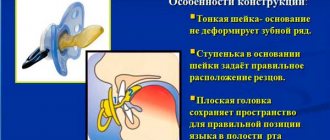Mother's breast milk is considered the best food for a newborn baby, as it contains all the essential elements it needs. Many mothers are interested in the question of up to what age should a child be fed breast milk according to modern pediatric concepts in order to create optimal conditions for his growth and development. It should be noted right away that there is no specific age for the baby at which a woman should stop putting him to her breast.
Each child is unique and has its own physiological needs, so no pediatrician can accurately determine when the lactation process should be interrupted. Many experts are inclined to believe that the best option would be if natural feeding itself comes to naught when there is such an opportunity. This usually occurs after the age of 2.5-3 years. Two people are involved in this process, that is, mother and child, so the duration of feeding will depend only on them.
Long-term breastfeeding has many positive factors, such as:
- replenishment of a growing and developing organism with all necessary substances in an easily accessible and digestible form;
- increased immune defense;
- calming effect on a small child;
- formation of a healthy psyche;
- formation and development of the brain and nervous system;
- physical and psychological unity of mother and baby;
- convenience for mom.
Of course, the priorities of long-term breastfeeding are more than enough, therefore, many pediatricians recommend putting the baby to the breast for at least 2 years. Moreover, after the child reaches this age, it will be much easier for the mother to complete feeding without traumatizing his psyche.
The importance of breastfeeding in the 1st and 2nd year of life
Breastfeeding under the age of one year is considered simply necessary, since the immature digestive tract of a baby is very difficult to digest other foods in the form of cow's milk or adapted milk formula. This feeding option almost always brings many problems in the form of allergies, diathesis or dysbacteriosis.
The most optimal and simply necessary nutrition will always remain breast milk, which contains all the necessary vitamins, minerals, amino acids, proteins, fats and carbohydrates in exactly the form needed for the formation and growth of the baby. Moreover, breast milk already contains the necessary enzymes to absorb these components, since its own enzymatic system begins to function normally only by 5-6 months of the baby’s life.
Immune protection in this case is also 100% ensured, because specific proteins of mother’s milk in the form of interferon, types of immunoglobulins and other components systematically enter the baby’s body, thereby forming its own protective forces.
A lot has been written and talked about the importance and benefits of breastfeeding, but there is scant information about the need to continue to attach the baby to the mother’s breast after one year of age and until what age to breastfeed. Experts and mothers have different opinions on this issue.
Many representatives of the fair sex interrupt this wonderful process because they believe that breast milk is no longer useful or even harmful for an older child. However, this judgment is misleading, and the benefits of mother’s milk only increase in the 2nd and 3rd years of lactation. So it contains approximately 1000 components important for the baby, which are simply not possible to synthesize artificially.
The highest quality adapted milk formula contains no more than 200 components, and cow's milk, which was previously fed to artificial babies, is generally prohibited from being introduced into the diet of infants under one year of age. Therefore, modern recommendations of obstetricians-gynecologists, neonatologists and pediatricians are that a child should be breastfed until the age of more than 2 years .
Breastfeeding age
Until what age should you breastfeed? The topic for debate is more than hot. The most fierce “battles” take place in this area. Opinions and advice differ so much from each other that your head is spinning. Some argue that the first trimester of breastfeeding is quite enough, while others are ready to breastfeed for as long as 3 years. Finding the “golden mean” in the question of how long a child should be breastfed is the only way to dot all the i’s.
Beloved by many mothers, Dr. Komarovsky expresses the opinion of the majority of pediatricians and scientists in the field of child development on this issue. He offers the following solution to the issue:
- 0 months - 6 months – The baby eats only mother’s milk. Of course, the rule strictly applies if the mother has enough milk. At the same time, it is not recommended to introduce complementary foods ahead of time, and also to completely eliminate supplementation with water, and especially with juices. Dry bread, crackers and other snacks are also completely excluded.
- After 1 year, breastfeeding can continue if the woman herself desires and is able. Children of this age group already eat a very varied diet and the lack or absence of milk from the mother will no longer be a stumbling block.
We suggest you familiarize yourself with: The meaning of the name Georgy, origin and characteristics
The conclusion from this is this: doctors recommend feeding newborns in the first half of life only with mother’s milk, since during this period it exhibits the main nutritional and protective functions. Feeding with mother's milk in later stages is a personal matter for each individual family.
WHO opinion
In fact, there are practically no disputes about feeding six-month-old and one-year-old children. This time period is perceived by most as the stage of active breastfeeding. All questions and disputes begin just after 1 year. Doctors convince mothers of the advisability of maintaining lactation after a year.
Today, mothers have no problems with introducing high-quality complementary foods, which means there will be a minimum of medical difficulties.

Modern mothers can buy high-quality store-bought baby products or prepare complementary feeding meals themselves
The American Association of Pediatrics decides how much to breastfeed a baby as follows:
- 0-6 months - feed only breast milk;
- 0.5-1 year – feeding with milk with the introduction of complementary foods;
- after 1 year - if possible and desired by the mother, lactation can be continued or completed.
Until what age should a baby be breastfed? Mother's milk is useful for every child, no matter the number of months or years lived. Breast milk is not only food, but also water, which perfectly satisfies the baby's drinking needs.

In addition to the positive aspects of breastfeeding large children, there are also a number of disadvantages:
- Exhaustion of the maternal body.
In order to produce breast milk, a woman's body mobilizes significant resources. Long-term breastfeeding, especially in combination with an unbalanced diet, can lead to a lack of vitamins, affecting the condition of the mother’s skin and hair.
- Excessive psychological attachment of the child to the mother.

Some pediatricians believe that too long a period of breastfeeding (3 years or more) creates a kind of dependence on the baby’s mother. This interferes with the formation of independence.
- Negative social attitudes towards breastfeeding large children in public places.
Pediatricians consider the most suitable age for weaning a child to be one and a half years old and older. You should not start this process while you are feeling unwell. A gradual reduction in the number of attachments will minimize stress factors for the baby and mother, ending breastfeeding painlessly.
For Mom
Long-term breastfeeding has both its pros and cons. For mom, the positives are not so easy to find. Perhaps those special, unforgettable sensations that no other activity can give. You can also remember the fact that breast milk does not need to be prepared. It is already ready-made, so simple laziness dictates the rules and the woman feeds the baby longer so as not to think about the variety of the menu.
Among the disadvantages is fatigue. A child over 2 years old will voluntarily reach under his clothes, demand the breast, may throw tantrums, and harass his mother with constant requests to feed him. After all, at that age, he already receives nutrients from regular food and he needs the breast for another purpose - peace of mind, stress relief, close contact with his mother.
For a child
One of the advantages should be noted - the functioning of the immune system. It has been observed that breastfed babies are better able to resist colds. The disadvantages are the child’s lack of independence. This does not only mean psychological dependence on the breast. The fact is that the sucking reflex gradually fades away.
We invite you to read: Debunking popular myths about hair extensions
During the allotted time, it is necessary for the child to learn to consume “adult” food. His digestive system must mature, and it can do this only when the baby himself can cope with its consumption and processing. The same applies to stress; prolonged breastfeeding deprives the child of the ability to independently overcome stress and calm down using other methods.
Lactoferrin
In the composition of breast milk, after a year from the moment of delivery, lactoferrin begins to be intensively produced, that is, a protein that in the child’s body performs the following functions:
- immune defense and anti-inflammatory activity increases significantly;
- clear regulation of the growth and division of bone marrow cells is ensured, which in later life will prevent the development of anemia and oncological pathologies of the hematopoietic organs and blood;
- the necessary composition of the intestinal microflora is laid down, which prevents dysbiosis and ensures maximum absorption of nutrients;
- The child’s body’s resistance to many types of infectious, viral and fungal diseases increases.
Scientists have proven that lactoferrin, found in breast milk, can inhibit the growth and division of cancer cells, as well as prevent metastasis . It is used to create expensive drugs aimed at combating cancer pathologies. This protein is very valuable and has an excellent effect on the growing and developing body of the baby, especially in the 2nd and 3rd years of life. Therefore, to the question of up to what age should you continue to breastfeed your baby, there is one comprehensive answer, which says that the more, the better.
If the baby does not eat anything other than breast milk
Sometimes parents are faced with the following problem: the child does not eat anything other than breast milk. In such cases, introducing complementary foods not according to the usual pattern recommended by pediatricians helps. It is rational to follow the rules of the so-called pedagogical complementary feeding. It lies in the fact that with unlimited consumption of breast milk, the baby receives in microdoses what the whole family eats, naturally avoiding harmful, spicy, canned foods. In any case, pressure and violence with food will only aggravate the situation, and abrupt weaning will cause stress.
No matter how beneficial breast milk is for a baby, managing the feeding process should bring joy to both parties. If the mother is calm and affectionate, the baby will be fine in any case, no matter how many months or years she breastfeeds him.
When should you wean your baby from the breast?
To stop breastfeeding, there are certain criteria that indicate that the baby practically no longer needs his mother’s breast and can easily do without it. Thus, experts note the following signs of a baby’s readiness to say goodbye to the taste of mother’s milk forever:
- the recommended weaning age should be at least 2 years, if the mother has still managed to maintain lactation;
- the baby eats well a variety of food from the common table;
- moments of latching to the breast are present only in the morning and evening or before sleep (no more than 3-4 times a day);
- the child is easily distracted from the desire to suckle if he is offered a toy or is occupied with some kind of game;
- calmly falls asleep without mother's participation in the presence of another family member;
- If you are injured during a game, you don’t need to put your hand on your chest to calm down.
If the mother is tired of breastfeeding the baby, and he feels great without her, remembering this need only before bed, you can think about stopping breastfeeding. In general, a child is fed breast milk until the age when it is possible to come to an agreement with him, that is, the baby already fully understands the mother’s explanations. This moment occurs no earlier than 2-2.5 years, which makes it possible to reduce single episodes of breastfeeding to nothing without traumatizing the child’s psyche.
Found a mistake? Select it and press Ctrl + Enter
How to end night applications
Before you start weaning your baby off night feedings, make sure your baby is able to fall asleep without breastfeeding. If your child is able to fall asleep in a stroller, in the arms of grandma or dad, then you can start weaning.
For several days, tell your child that everyone sleeps at night - birds, fish, animals, and people. Mom should sleep too. Repeat this phrase as often as possible, including before bed.
Weaning your baby from the breast will be much easier if he sleeps separately from his parents. When the baby wakes up at night, it is advisable for one of the relatives, such as dad or grandmother, to come to him. Try to calm him down on your own, without mom's help.
But during daytime wakefulness, the mother needs to spend as much time as possible with the baby so that he does not feel deprived. Hug and stroke your baby as often as possible - close physical contact during the day will compensate for the lack of breasts at night.
We suggest you read: What medicine can pregnant women take if they have allergies?










